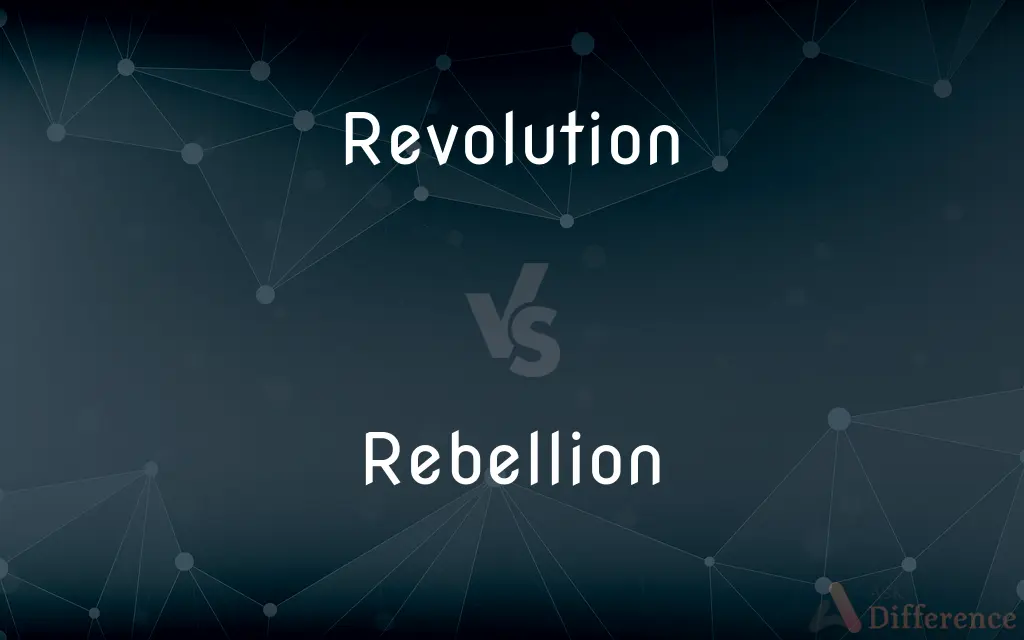Revolution vs. Rebellion — What's the Difference?
By Tayyaba Rehman — Updated on September 15, 2023
A revolution is a widespread change or overthrow of a system, while a rebellion is an act of violent or open resistance against an established authority.

Difference Between Revolution and Rebellion
Table of Contents
ADVERTISEMENT
Key Differences
A revolution typically signifies a profound change in a societal or political structure, often leading to the replacement of one governing entity with another. Such a transformation can either be peaceful or violent. Conversely, a rebellion refers to an uprising or an act of defiance against an established authority or order, and it may not necessarily aim for complete systemic change but could be a protest against specific policies or decisions.
In history, revolutions are viewed as broad, encompassing movements that redefine the very fabric of societies. The American and French Revolutions, for example, led to the establishment of entirely new political regimes. Rebellions, meanwhile, might be more localized or specific in their objectives. They might push against a particular policy or might be limited to a certain region.
It's important to note that revolutions can sometimes stem from rebellions. A small act of defiance or resistance can escalate and spread, leading to a wider movement that seeks comprehensive change. However, not all rebellions reach the point of revolution; many are quelled or negotiate resolutions without leading to systemic overhaul.
Furthermore, the term revolution isn't just limited to political contexts. It can also describe significant shifts in technology, culture, or economics, such as the Industrial Revolution. On the other hand, rebellion is generally associated with opposition or defiance against authority in various contexts, often with a connotation of being more short-lived than revolutions.
Comparison Chart
Definition
Profound systemic change
Resistance against established authority
ADVERTISEMENT
Scale
Widespread, often national
Can be localized or widespread
Duration
Can be prolonged
Often shorter-lived
Objective
Overthrow or establishment of new system
Specific policy change or opposition
Examples
American Revolution
Whiskey Rebellion
Compare with Definitions
Revolution
A dramatic and wide-reaching change in conditions, attitudes, or operation.
The digital revolution transformed the way we communicate.
Rebellion
An act of armed resistance to an established government or ruler.
The rebellion was quickly suppressed by the military.
Revolution
Rotation or movement of an object around its own axis.
Earth completes one revolution around the sun in a year.
Rebellion
A show of opposition to a prevailing idea or practice.
Her fashion choices are a rebellion against mainstream trends.
Revolution
A cycle of events in a recurring sequence.
The revolution of the seasons brings about diverse climatic changes.
Rebellion
The action or process of resisting control or convention.
Teenage rebellion is often seen as a rite of passage.
Revolution
A forcible overthrow of a government or societal order.
The French Revolution reshaped the nation's political landscape.
Rebellion
An uprising against a perceived wrong or injustice.
The citizens staged a rebellion against the unfair taxes.
Revolution
In political science, a revolution (Latin: revolutio, "a turn around") is a fundamental and relatively sudden change in political power and political organization which occurs when the population revolts against the government, typically due to perceived oppression (political, social, economic) or political incompetence. In book V of the Politics, the Ancient Greek philosopher Aristotle (384–322 BC) described two types of political revolution: Complete change from one constitution to another Modification of an existing constitution.Revolutions have occurred through human history and vary widely in terms of methods, duration and motivating ideology.
Rebellion
Rebellion, uprising, or insurrection is a refusal of obedience or order. It refers to the open resistance against the orders of an established authority.A rebellion originates from a sentiment of indignation and disapproval of a situation and then manifests itself by the refusal to submit or to obey the authority responsible for this situation.
Revolution
Orbital motion about a point, especially as distinguished from axial rotation
The planetary revolution about the sun.
Rebellion
An act of armed resistance to an established government or leader
The authorities put down a rebellion by landless colonials
The Bretons rose in rebellion against the King
Revolution
A turning or rotational motion about an axis.
Rebellion
Open, armed, and organized resistance to a constituted government.
Revolution
A single complete cycle of such orbital or axial motion.
Rebellion
An instance of this.
Revolution
The overthrow of one government and its replacement with another.
Rebellion
Defiance toward an authority or established convention
An act of adolescent rebellion.
Revolution
A sudden or momentous change in a situation
The revolution in computer technology.
Rebellion
An instance of this.
Revolution
(Geology) A time of major crustal deformation, when folds and faults are formed.
Rebellion
(uncountable) Armed resistance to an established government or ruler.
The government is doing its best to stop rebellion in the country.
Revolution
A political upheaval in a government or state characterized by great change.
Rebellion
(countable) Defiance of authority or control; the act of rebelling.
Having a tattoo was Mathilda's personal rebellion against her parents.
Revolution
The removal and replacement of a government, especially by sudden violent action.
Rebellion
(countable) An organized, forceful subversion of the law of the land in an attempt to replace it with another form of government.
The army general led a successful rebellion and became president of the country.
Revolution
Rotation: the turning of an object around an axis, one complete turn of an object during rotation.
Rebellion
The act of rebelling; open and avowed renunciation of the authority of the government to which one owes obedience, and resistance to its officers and laws, either by levying war, or by aiding others to do so; an organized uprising of subjects for the purpose of coercing or overthrowing their lawful ruler or government by force; revolt; insurrection.
No sooner is the standard of rebellion displayed than men of desperate principles resort to it.
Revolution
In the case of celestial bodies, the traversal of one body along an orbit around another body.
Rebellion
Open resistance to, or defiance of, lawful authority.
Revolution
A sudden, vast change in a situation, a discipline, or the way of thinking and behaving.
Rebellion
Refusal to accept some authority or code or convention;
Each generation must have its own rebellion
His body was in rebellion against fatigue
Revolution
A round of periodic changes, such as between the seasons of the year.
Rebellion
Organized opposition to authority; a conflict in which one faction tries to wrest control from another
Revolution
Consideration of an idea; the act of revolving something in the mind.
Rebellion
A refusal to obey orders or systems.
His acts of rebellion got him expelled from school.
Revolution
The act of revolving, or turning round on an axis or a center; the motion of a body round a fixed point or line; rotation; as, the revolution of a wheel, of a top, of the earth on its axis, etc.
Revolution
Return to a point before occupied, or to a point relatively the same; a rolling back; return; as, revolution in an ellipse or spiral.
That fearComes thundering back, with dreadful revolution,On my defenseless head.
Revolution
The space measured by the regular return of a revolving body; the period made by the regular recurrence of a measure of time, or by a succession of similar events.
Revolution
The motion of any body, as a planet or satellite, in a curved line or orbit, until it returns to the same point again, or to a point relatively the same; - designated as the annual, anomalistic, nodical, sidereal, or tropical revolution, according as the point of return or completion has a fixed relation to the year, the anomaly, the nodes, the stars, or the tropics; as, the revolution of the earth about the sun; the revolution of the moon about the earth.
Revolution
The motion of a point, line, or surface about a point or line as its center or axis, in such a manner that a moving point generates a curve, a moving line a surface (called a surface of revolution), and a moving surface a solid (called a solid of revolution); as, the revolution of a right-angled triangle about one of its sides generates a cone; the revolution of a semicircle about the diameter generates a sphere.
Revolution
A total or radical change; as, a revolution in one's circumstances or way of living.
The ability . . . of the great philosopher speedily produced a complete revolution throughout the department.
Revolution
A fundamental change in political organization, or in a government or constitution; the overthrow or renunciation of one government, and the substitution of another, by the governed.
The violence of revolutions is generally proportioned to the degree of the maladministration which has produced them.
Revolution
A drastic and far-reaching change in ways of thinking and behaving;
The industrial revolution was also a cultural revolution
Revolution
The overthrow of a government by those who are governed
Revolution
A single complete turn (axial or orbital);
The plane made three rotations before it crashed
The revolution of the earth about the sun takes one year
Revolution
A sudden, vast alteration in a situation.
The green revolution increased agricultural productivity.
Common Curiosities
Are revolutions always successful?
No, some revolutions are suppressed or fail to achieve their objectives.
Do all rebellions lead to revolutions?
Not necessarily; while some rebellions escalate into revolutions, others might not.
Can a revolution happen in technology?
Absolutely, like the technological revolution brought about by the internet.
Is every revolution violent?
No, revolutions can be peaceful, like the Velvet Revolution in Czechoslovakia.
How do experts differentiate between a revolution and rebellion?
Experts consider factors like objectives, scale, and duration to differentiate.
Have revolutions shaped world history?
Undoubtedly, revolutions like the Russian and American have profoundly impacted global events.
Can a rebellion be non-violent?
Yes, rebellions can manifest as non-violent protests or civil disobedience.
Are there non-political revolutions?
Yes, like cultural revolutions or the Agricultural Revolution.
What's a famous historical rebellion?
The Boxer Rebellion in China is a notable historical example.
Can revolution and rebellion be used interchangeably?
While related, they have different connotations and aren't always interchangeable.
Is rebellion always against a government?
No, rebellion can also be against cultural norms, societal expectations, or any authority.
Is every act of defiance a rebellion?
Not necessarily; small acts of defiance aren't always termed as rebellions.
How do revolutions impact societies?
Revolutions can reshape societal norms, political structures, and economies.
Is rebellion a natural human tendency?
While not universal, challenging authority or status quo can be a recurring human trait.
Why do people rebel?
Reasons can include perceived injustices, oppression, or a desire for autonomy.
Share Your Discovery

Previous Comparison
Block vs. Unfriend
Next Comparison
Clout vs. LeverageAuthor Spotlight
Written by
Tayyaba RehmanTayyaba Rehman is a distinguished writer, currently serving as a primary contributor to askdifference.com. As a researcher in semantics and etymology, Tayyaba's passion for the complexity of languages and their distinctions has found a perfect home on the platform. Tayyaba delves into the intricacies of language, distinguishing between commonly confused words and phrases, thereby providing clarity for readers worldwide.














































